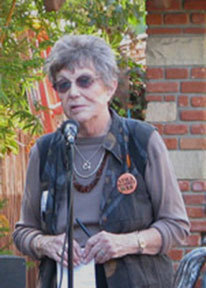A panel of women scholars whose paths have crossed that of oral historian Sherna Berger Gluck described a woman who inspired them, challenged them and permanently affected their lives.
She has been their mentor, they said.
“I never, ever identified myself as a mentor,” she insisted. Rather, she prefers calling herself an advocacy oral historian and activist scholar.
Certainly she is those things, but she also is a “mentor extraordinaire,” said Maylei Blackwell, vice chair of Chicano/Chicana Studies at the University of California, Los Angeles.
“She wasn’t a hold-your-hand mentor,” Blackwell said. “She was a kick-your-ass mentor.”
Blackwell said that until she was drawn into her mentor’s orbit, “I really thought I was going to be a waitress.”
Instead, she became a scholar and activist. “Sherna taught me that activism wasn’t something you did on the side,” Blackwell said.
Autumn Varley of Nipissing University in North Bay, Ontario, Canada, said Gluck’s work taught her that oral history is about building relationships. That lesson proved critical in Varley’s work involving interviews with indigenous interpreters at a Canadian historic site.
Varley said she spent time traveling, eating, crafting and having tea with grandmothers, letting them know she wanted to learn from them. And she didn’t use a recorder. “It was all etched on my heart and in my mind,” she said.
Gluck spent the bulk of her career at California State University, Long Beach, where she was director of the Oral History Program. There, she began an oral history archive that focused not just on university presidents and famous professors, common in many campus oral history collections. Instead, her program collected interviews from a wide range of community members, particularly focusing on women, labor and ethnic histories. As technology evolved, those interviews became the university’s Virtual Oral/Aural History Archive.
Gluck’s notable work also includes the oral history-based “Rosie the Riveter Revisted: Women, The War, and Social Change” and “An American Feminist in Palestine.”
Independent scholar Karen Harper said the ground-breaking feminist oral historian stressed the importance of ethics in oral history. “The core of Sherna’s approach to oral history is respect,” Harper said.
And attendees at the roundtable testified to her respect for them as younger scholars pursuing activist, feminist roles.
“You gave us opportunity, and that is the important thing for younger scholars,” said OHA past president Rina Benmayor. “Thank you, Sherna.”

